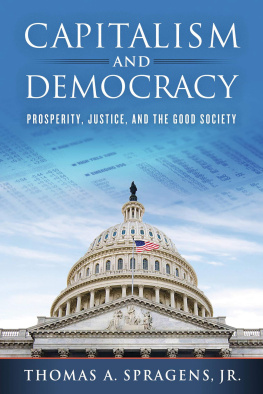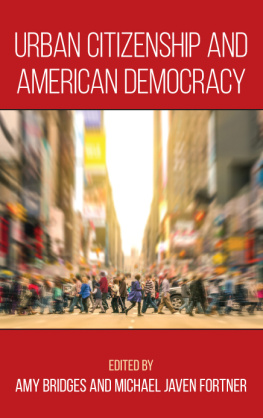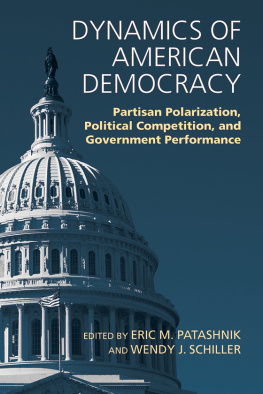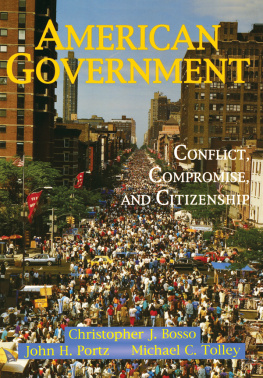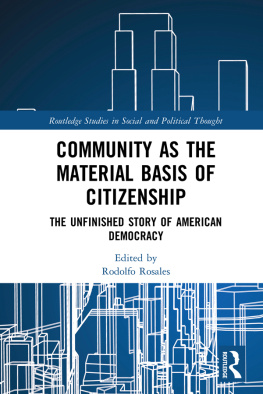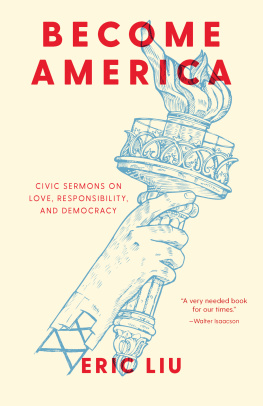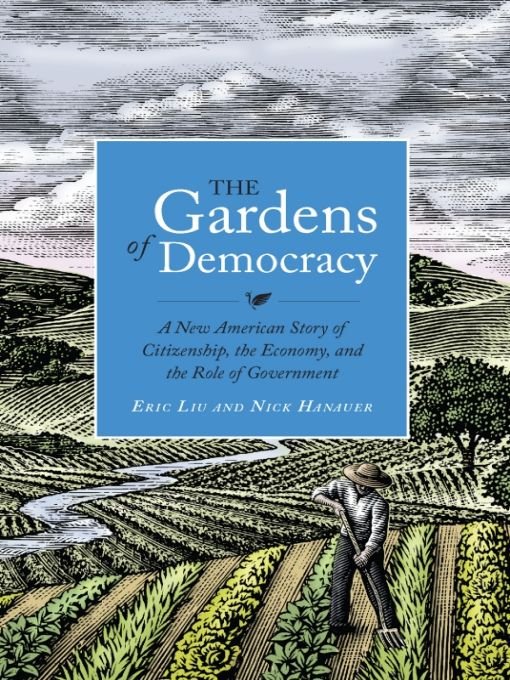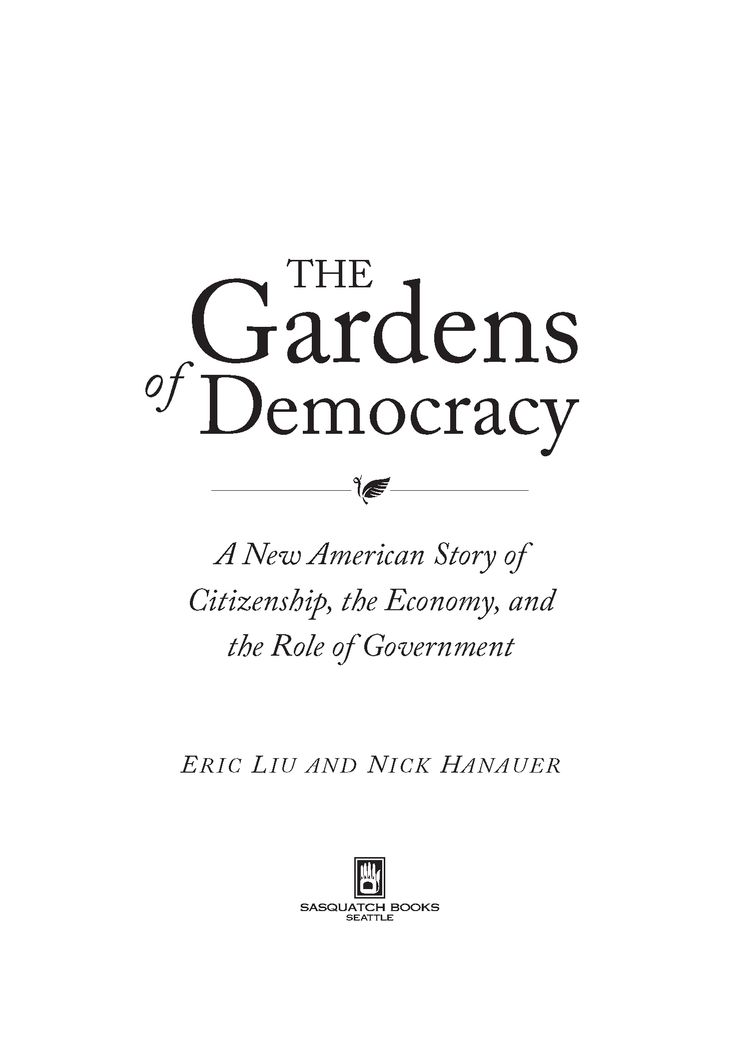Table of Contents
Praise for The Gardens of Democracy
The Gardens of Democracy provides a refreshing new conceptual approach to understanding our economic and political situation, and it will help us move past the fossilized ideas in todays public debates.
FRANCIS FUKUYAMA, author of The Origins of Political Order and Olivier Nomellini Senior Fellow, Freeman Spogli Institute for International Studies, Stanford University
In highly engaging style, Liu and Hanauer capture the revolution underway in our understanding of how economies and social systems work. They offer a provocative, inspiring vision of citizenship, democracy, and the role of government. This slender book with big ambitions deserves to be read, debated, and read again.
ERIC BEINHOCKER, author of The Origin of Wealth
Society is a garden. Liu and Hanauers simple metaphor makes the complexities and limits of social policy emerge before your eyes. Statists cant see the interconnections of organic systems. Free marketers cant see that a garden needs some tending. If youre looking for a way forward out of Americas dangerous gridlock, read this wonderful book.
JONATHAN HAIDT, professor of psychology, University of Virginia, and author of The Righteous Mind: Why Good People are Divided by Politics and Religion
Eric Liu and Nick Hanauer are progressives who always think outside the box, and thats why everyone should pay attention to them. The Gardens of Democracy shakes up our stale debate over governments role in a dynamic society, and in a thoughtful, creative, and inventive way. Everyone will find something to disagree with here, and thats the point: getting us out of our comfort zones is an immensely useful democratic undertaking.
E. J. DIONNEJR., author of Why Americans Hate Politics
Liu and Hanauer get it right. They powerfully show how the complex, modern world requires new thinking and new policies that recognize the adaptive, mutualist nature of our economic, political, and social systems. This is a fabulous book!
SCOTT E. PAGE, author of Diversity and Complexity and director of the Center for the Study of Complex Systems, University of Michigan
The great contribution of Eric Liu and Nick Hanauer in The Gardens of Democracy is to explain how the very categories we use to think about our political problems prevent us from understanding and solving them. Theyre a scouting party venturing upriver for the rest of us, and wed be foolish not to heed their reports.
MICHAEL TOMASKY, editor, Democracy: A Journal of Ideas
Of Gardens and Gardeners
Effective gardening requires the right setting: fertile soil, good light, water.
It requires a strong view as to what should and should not be grown.
It requires a loving willingness to tend constantly, to fertilize and nurture what we seed.
It requires a hard-headed willingness to weed what does not belong.
Great gardeners would never simply let nature take its course. They take responsibility for their gardens.
Great gardeners assume change in weather and circumstance. They adapt.
Great gardens are sustainable only with continuous investment and renewal. Great gardeners turn the soil and rotate the plantings.
Human beings, it is said, originated in a garden. Perhaps this is why all of us understand so intuitively what it takes to be great gardeners.
I. Seeds
Gardenbrain vs. Machinebrain
The failure of our politics to keep pace with realityThe way ideology prevents adaptionNew science gives us new sight about how the world worksWhat must follow is a new story: about self-interest, the meaning of citizenship, the nature of the economy, and the role of governmentThe gardens of democracy
AMERICA IS AN EXPERIMENT. It is an experiment in democracy, still the greatest the world has ever seen. But it is also, like every nation, human community, or living organism, an experiment in evolution.
One thing that has made America exceptional thus far has been its ability to adapt. From the founding onward, this nation has reckoned with its own internal contradictions and with external threatsthe insufficiency of the Articles of Confederation, the poison pill of slavery, the rise of the Robber Barons, the emergence of totalitarian enemiesand it has evolved successfully in response to such circumstances.
The question today is, can we still adapt? Will our experiment get another cycle? Or has our societys capacity to evolve run its course?
The failure of American politics to address and solve the great challenges of our timeclimate change, debt and deficits, worsening schools, rising health care costs, the shriveling of the middle classis not just a failure of will or nerve. It is equally a failure of ideas and understanding. And the failure to address these challenges isnt just a matter of politics, but of survival.
To begin with, we labor today under a painfully confining choice between outmoded ideologies on both the left and the right. On the left, too many remain wedded to paradigms first formed during the decades between the Progressive Era and the New Deal. They are top-down, prescriptive, bureaucratic notions about how to address social challenges. These state-centric approaches made sense in a centralizing, industrializing America. They make much less sense in the networked economy and polity of today.
On the right, we hear ideas even more historically irrelevant : laissez-faire economics and a dont tread on me idea of citizenship that might have been tolerable in 1775 when the country had 3 million largely agrarian inhabitants, only some of whom could vote, but is at best nave and at worst destructive in a diverse, interdependent, largely urban nation of over 300 million.
Our politics has become an over-rehearsed, over-ritualized piece of stage combat between these two old ideologies. False choice after polarizing false choice emanates from Washington. Both ideologiesindeed, the surrender of American politics to ideology itself, and the abandonment of pragmatism as a guiding political philosophy make it harder by the day for America to adapt.
We wrote this short book to offer a new way. We aim to reach not moderates or centrists who split the difference between left and right. We aim to reach those who think independently. That might mean those who claim no party affiliation, though it also includes many loyal Democrats and Republicans. It definitely means those who are uncomfortable being confined by narrow choices, old paradigms, and zero-sum outcomes.
If you can hold these paired thoughts in your head, we wrote this book for you:




